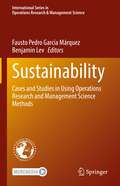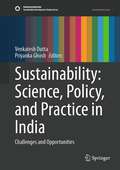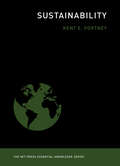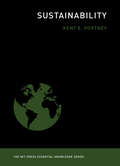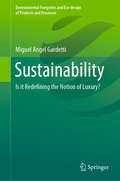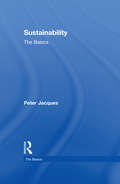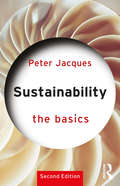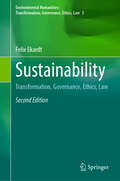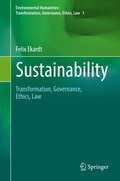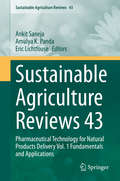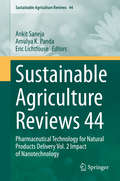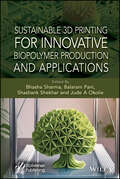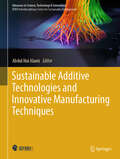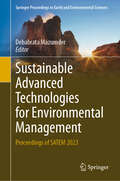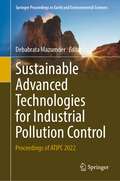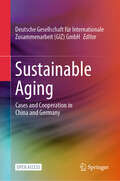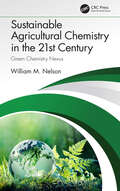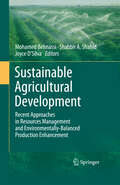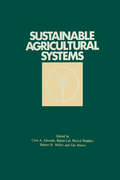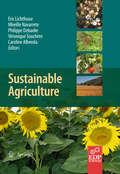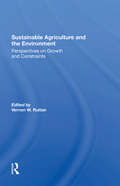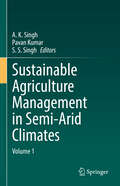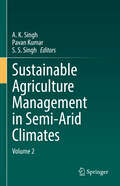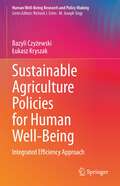- Table View
- List View
Sustainability: Cases and Studies in Using Operations Research and Management Science Methods (International Series in Operations Research & Management Science #333)
by Fausto Pedro García Márquez Benjamin LevThis book provides relevant theoretical frameworks and the latest empirical research findings in Operations Research (OR) and Management Science (MS) as applied to sustainability. Its goal is to identify and describe ways in which OR and MS have been applied to and influenced the development of sustainability. Many of the issues we face today stem from the interconnectivity of the economy, society, and the environment, and from how both the economy and society are affecting the environment. In response, there have been a range of local and global efforts to advance society without harming the natural environment. The book showcases how OR/MS can help to address these issues, specifically with regard to renewable energy, smart industry, smart cities, transportation, smart homes and devices, etc. This book is intended for professionals in the fields of energy, engineering, information science, mathematics and economics, and for researchers who wish to develop new skills in connection with sustainability, or whose work involves sustainability.
Sustainability: Challenges and Opportunities (Sustainable Development Goals Series)
by Venkatesh Dutta Priyanka GhoshThis book is an interdisciplinary work that reveals the contemporary sustainability narratives in India within the context of various SDGs. Several case studies are presented, each of which sheds light on the challenges and constraints that are impeding the process of achieving SDGs and investigates potential long-term answers to socio-economic and environmental issues. Through empirical case studies from different parts of India, the book explores the current status of achieving sustainable development goals in India. The volume immensely benefits scientists, researchers, policymakers and practitioners as it offers a thematic and comprehensive understanding of challenges associated with mainstreaming SDGs at national, sub-national, and micro scales in India.
Sustainability: Creating The Green Metropolis (MIT Press Essential Knowledge series)
by Kent E. PortneyA concise and accessible examination of sustainability in a range of contemporary contexts, from economic development to government policy.The word “sustainability” has been connected to everything from a certain kind of economic development to corporate promises about improved supply sourcing. But despite the apparent ubiquity of the term, the concept of sustainability has come to mean a number of specific things. In this accessible guide to the meanings of sustainability, Kent Portney describes the evolution of the idea and examines its application in a variety of contemporary contexts—from economic growth and consumption to government policy and urban planning.Portney takes as his starting point the 1987 definition by the World Commission on Environment and Development of sustainability as economic development activity that “meets the needs of the present without compromising the ability of future generations to meet their own needs.” At its heart, Portney explains, sustainability focuses on the use and depletion of natural resources. It is not the same as environmental protection or natural resource conservation; it is more about finding some sort of steady state so that the earth can support both human population and economic growth. Portney looks at political opposition to the promotion of sustainability, which usually questions the need for sustainability or calls its costs unacceptable; collective and individual consumption of material goods and resources and to what extent they must be curtailed to achieve sustainability; the role of the private sector, and the co-opting of sustainability by corporations; government policy on sustainability at the international, national, and subnational levels; and how cities could become models for sustainability action.
Sustainability: Creating The Green Metropolis (The MIT Press Essential Knowledge series)
by Kent E. PortneyA concise and accessible examination of sustainability in a range of contemporary contexts, from economic development to government policy.The word “sustainability” has been connected to everything from a certain kind of economic development to corporate promises about improved supply sourcing. But despite the apparent ubiquity of the term, the concept of sustainability has come to mean a number of specific things. In this accessible guide to the meanings of sustainability, Kent Portney describes the evolution of the idea and examines its application in a variety of contemporary contexts—from economic growth and consumption to government policy and urban planning.Portney takes as his starting point the 1987 definition by the World Commission on Environment and Development of sustainability as economic development activity that “meets the needs of the present without compromising the ability of future generations to meet their own needs.” At its heart, Portney explains, sustainability focuses on the use and depletion of natural resources. It is not the same as environmental protection or natural resource conservation; it is more about finding some sort of steady state so that the earth can support both human population and economic growth. Portney looks at political opposition to the promotion of sustainability, which usually questions the need for sustainability or calls its costs unacceptable; collective and individual consumption of material goods and resources and to what extent they must be curtailed to achieve sustainability; the role of the private sector, and the co-opting of sustainability by corporations; government policy on sustainability at the international, national, and subnational levels; and how cities could become models for sustainability action.
Sustainability: Is it Redefining the Notion of Luxury? (Environmental Footprints and Eco-design of Products and Processes)
by Miguel Angel GardettiThis book presents and analyzes aspects that, within the framework of luxury, have been or are currently being redefined by sustainability considerations. It also presents and reviews cases from industry and entrepreneurs in connection with this ongoing redefinition process.
Sustainability: The Basics (The Basics)
by Peter JacquesSustainability is concerned with the issues around the ongoing and mutual preservation of both society and the environment. It is a widely used term and supposed goal for many governments but it is also easily misunderstood. Sustainability: The Basics offers an accessible and interdisciplinary introduction to the concept, and discusses key questions such as: How do we decide who or what should be sustained? How can we ensure that the world’s resources are distributed fairly? What lessons can we learn from the collapse of previous civilizations? Sustainability studies is in a position to ask some of the most interesting questions about human purpose, identity, modernity, ethics, and the nature of "progress". This book is an ideal starting point for anyone who wants to know more about we can ‘hold up’ civilization, humanity, and the world we live in.
Sustainability: The Basics (The Basics)
by Peter JacquesSustainability is a pressing concern for people and governments around the world, but it is also an essentially contested concept that requires an understanding of the stakes, trade-offs, and complex politics at play. Sustainability: The Basics offers an accessible and interdisciplinary introduction to the concept, and discusses key questions such as: What are the core principles of sustainability? What are the key ethical considerations for questions of sustainability? How do we measure sustainability? What are the critical obstacles to achieving global sustainability? What happens when societies fail to observe principles of sustainability? Fully updated in its second edition, Sustainability: The Basics now includes coverage of the Sustainable Development Goals, a global range of case studies and explores the complex social dynamics of Earth system changes that affect our critical life supports. The second edition also proposes a new, "sustainable humanism" that animates much of our work to make a better, more humane world. As the world reels from the effects of the Covid-19 pandemic, this book is an ideal starting point for anyone who wants to know more about what we need to do to sustain civilization, humanity, and the world we live in.
Sustainability: Transformation, Governance, Ethics, Law (Environmental Humanities: Transformation, Governance, Ethics, Law #5)
by Felix EkardtThis book proposes a holistic transdisciplinary approach to sustainability and post-fossil societies as a subject of social sciences - at a time when post-fossilisation is becoming a core political concern due to the aggressive foreign policy of autocracies, also for reasons beyond sustainability. Furthermore, the book shows new ways, as perspectives of philosophy, political science, law, economics, sociology, cultural studies and others are here no longer regarded separately. Instead, integrated perspectives on the key issues are carved out: Perspectives on conditions of transformation to sustainability, on key instruments and the normative questions. This allows for a concise answer to urgent and controversial questions such as the following: Is the EU an environmental pioneer? Is it possible to achieve sustainability by purely technical means? If not: will that mean to end of the growth society? How to deal with the follow-up problems? How will societal change be successful? Are political power and capitalism the main barriers to sustainability? What is the role of emotions and conceptions of normality in the transformation process? To which degree are rebound and shifting effects the reason why sustainability politics fail? How much climate protection can be claimed ethically and legally e.g. on grounds of human rights? And what is freedom? Despite all rhetoric, the weak transition in energy, climate, agriculture and conservation serves as key example in this book. It is shown how the Paris Agreement is weak with regard to details and at the same time overrules the growth society by means of a radical 1,5 degrees temperature limit. It is shown how emissions trading must – and can – be reformed radically. It is shown why CSR, education, cooperation and happiness research are overrated. And we will see what an integrated politics on climate, biodiversity, nitrogen and soil might look like. This book deals with conditions of transformation, governance instruments, ethics and law of sustainability. The relevance of the humanities to sustainability has never before been demonstrated so vividly and broadly as here. And in every area it opens up some completely new perspectives.
Sustainability: Transformation, Governance, Ethics, Law (Environmental Humanities: Transformation, Governance, Ethics, Law)
by Felix EkardtThis book proposes a holistic transdisciplinary approach to sustainability as a subject of social sciences. At the same time, this approach shows new ways, as perspectives of philosophy, political science, law, economics, sociology, cultural studies and others are here no longer regarded separately. Instead, integrated perspectives on the key issues are carved out: Perspectives on conditions of transformation to sustainability, on key instruments and the normative questions. This allows for a concise answer to urgent and controversial questions such as the following: Is the EU an environmental pioneer? Is it possible to achieve sustainability by purely technical means? If not: will that mean to end of the growth society? How to deal with the follow-up problems? How will societal change be successful? Are political power and capitalism the main barriers to sustainability? What is the role of emotions and conceptions of normality in the transformation process? To which degree are rebound and shifting effects the reason why sustainability politics fail? How much climate protection can be claimed ethically and legally e.g. on grounds of human rights? And what is freedom? Despite all rhetoric, the weak transition in energy, climate, agriculture and conservation serves as key example in this book. It is shown how the Paris Agreement is weak with regard to details and at the same time overrules the growth society by means of a radical 1,5-1,8 degrees temperature limit. It is shown how emissions trading must – and can – be reformed radically. It is shown why CSR, education, cooperation and happiness research are overrated. And we will see what an integrated politics on climate, biodiversity, nitrogen and soil might look like.
Sustainable Agriculture Reviews 43: Pharmaceutical Technology for Natural Products Delivery Vol. 1 Fundamentals and Applications (Sustainable Agriculture Reviews #43)
by Eric Lichtfouse Ankit Saneja Amulya K. PandaThis edited book comprises of eight chapters dealing on various aspects of pharmaceutical technology for delivery of natural products. Book chapters deal with the solubility and bioavailability enhancement technologies for natural products. Emphasis has also been given on the significance of delivery strategies for improving the therapeutic efficacy of paclitaxel, galantamine and tea constituents.
Sustainable Agriculture Reviews 44: Pharmaceutical Technology for Natural Products Delivery Vol. 2 Impact of Nanotechnology (Sustainable Agriculture Reviews #44)
by Eric Lichtfouse Ankit Saneja Amulya K. PandaThis book covers nanotechnology based approaches for improving the therapeutic efficacy of natural products. It critically explores lipid nanoarchitectonics, inorganic particles and nanoemulsion based tools for delivering them. With its chapters from eminent experts working in this discipline, it is ideal for researchers and professionals working in the area.
Sustainable 3D Printing for Innovative Biopolymer Production and Applications
by Shashank Shekhar Bhasha Sharma Jude A. Okolie Balaram PaniThis book highlights 3D-printed biopolymers’ advancements and sustainability, exploring cutting-edge research and real-world applications. Biopolymers have garnered global interest due to environmental concerns and are widely utilized in applications such as biomedicine, food, textiles, and cosmetics. Techniques like 3D printing have been extensively studied to fabricate reliable and efficient products, particularly in tissue engineering. These techniques enable the production of materials with complex structures and diverse functional groups. The book provides a comprehensive account of contemporary advancements in 3D-printed biopolymers, emphasizing their role in promoting sustainability and supporting the circular economy. Featuring meticulously curated chapters by leading scientists, it integrates diverse disciplines, including green biopolymers, nanotechnology, functionalization techniques, and material synthesis, offering a holistic understanding of the field. Several chapters delve into 3D printing processing techniques and their applications in areas such as water purification, energy storage, and biomedical advancements. Additionally, the book addresses progress in biopolymer technology, exploring its challenges and future prospects. Audience This book is ideal for industrial manufacturers, environmental chemists, materials and biopolymer scientists, and researchers in industries such as biomedicine, food, textiles, packaging, and cosmetics.
Sustainable Action in Economy and Society: Orientation for Change
by Reiner Manstetten Malte Faber Marc Frick Marco Rudolf Mi-Yong BeckerClimate change, species extinction, energy and raw material shortages are global challenges that are directly linked to our economic activity. They affect our very existence and jeopardize our ability to lead a good life today and in the future, both as a society and as individuals. The range of questions for which we need answers seems limitless and finding the "right" path for global change increasingly utopian. How do we maintain an overview in the face of highly complex interrelationships and interactions? How can we distinguish the essential from the non-essential? What fundamental relationships in nature do we need to take into account? What kind of economy is appropriate? What is just? And under what conditions are people willing to change? This book offers orientation. It deals with concepts from the natural sciences, economics and philosophy - including time, thermodynamics, scarcity, responsibility and justice - which enable an understanding of the upcoming transformation to sustainability from different perspectives. Ideally, they serve as guidelines for effective decisions and show how change is possible despite immense challenges. The book is aimed at anyone who wants to contribute to the transformation towards sustainability - whether in politics, business, administration or civil society.
Sustainable Additive Technologies and Innovative Manufacturing Techniques (Advances in Science, Technology & Innovation)
by Abdul Hai AlamiThis book offers a unique vantage point on converting ideas into products using additive manufacturing. Intended for novice and beginner designers, the process of industrial design is explained in order to translate verbal requirements into design constraints with the aid of the House of Quality approach. The product is then sketched and ported into a CAD software for modelling. The reader is then guided to the selection of the most appropriate additive manufacturing process, including PLA, resin, or metal 3D printing, along with material combination to meet their requirements. The book puts recyclability at the forefront of material discussion, from energy and circular economy perspectives, as they are central to achieving economic and energy efficiency. This is done by presenting the reader with do-it-yourself projects, which include processes like sand casting and lost PLA/Wax, that can be followed in a step-by-step manner using conventionally available tools.
Sustainable Advanced Technologies for Environmental Management: Proceedings of SATEM 2023 (Springer Proceedings in Earth and Environmental Sciences)
by Debabrata MazumderThis proceedings volume constitutes peer-reviewed full-length papers contributed by the Authors and tailored on various thematic areas of the 1st International Conference on Sustainable Advanced Technologies for Environmental Management (SATEM – 2023). The areas of research covered by these papers include but are not limited to: •Sustainable Water Quality Management •Advanced Water Treatment Technologies •Advanced Wastewater Treatment Technologies •Assessment and Control of Air Pollution •Solid and Hazardous Waste Management •Prevention of Groundwater Contamination •Wetland Management/Phyto- and Phyco-remediation •Case Studies in Urban and Rural Pollution Control •Management of Emerging Contaminants •Innovative Techniques for measuring environmental pollutants
Sustainable Advanced Technologies for Industrial Pollution Control: Proceedings of ATIPC 2022 (Springer Proceedings in Earth and Environmental Sciences)
by Debabrata MazumderThis proceedings volume constitutes peer-reviewed full-length papers contributed by the Authors and tailored on various thematic areas of the 3rd International Conference on “Advanced Technologies for Industrial Pollution Control” (ATIPC – 2022). The areas of research covered by these papers include but are not limited to: •Water quality monitoring and treatment in industrial area •Industrial effluent treatment, reuse and conservation •Monitoring of industrial emission and control •Industrial solid waste management •Handling and disposal of hazardous waste •Case Studies on industrial pollution control •Innovative technologies in industrial waste management
Sustainable Aging: Cases and Cooperation in China and Germany
by Deutsche Gesellschaft für Internationale Zusammenarbeit (GIZ) GmbHThis open access book discusses three areas in which Germany has long-standing experience and solutions that are valuable for other countries—care education, care insurance and standards for age-friendly city neighborhoods. It introduces the development background, application and shortcomings in the German and Chinese context, providing examples for from around the globe and showcasing the role of international cooperation projects in promoting knowledge exchange and advising on implementation in the country-specific context. Fast-paced demographic changes present a pressing challenge around the world. In Europe, the demographic problem, along with discussions on solutions, has been prevalent for many decades. And recently, it has also reached formerly developing countries in Asia, such as China. International cooperation, including international development cooperation, promotes the exchange of ways to tackle the social and economic challenges in order to find globally applicable solutions, thereby contributing to sustainable development. By presenting lessons learned in other countries, this book provides guidance for policy makers, city representatives and academicians seeking solutions for the challenges of an aging society in their own countries. Although the application of interventions is context-specific, the discussion and exchange on available solutions are essential to achieving socially sustainable and inclusive societies.
Sustainable Agricultural Chemistry in the 21st Century: Green Chemistry Nexus
by William M. NelsonAgriculture is one of the oldest and most global human enterprises, and as the world struggles with sustainable practices and policies, agricultural chemistry has a clear role to play. This book highlights the ways in which science in agriculture is helping to achieve global sustainability in the twenty- first century, and demonstrates that this science can and should be a leading contributor in discussions on environmental science and chemistry. The four drivers of this subject are presented, those being economic, environmental, regulatory and scientific, and help showcase agricultural chemistry as a dynamic subject that is contributing to this necessity of global sustainability in the twenty-first century.
Sustainable Agricultural Development
by Shabbir A. Shahid Mohamed Behnassi Joyce D'SilvaDue to many challenges (i.e. climate change, energy, water and land shortage, high demands on food, land grabbing, etc.), agriculture production potential is expected to be seriously affected; thus, increasing food insecurity and hunger in many already affected regions (especially in Africa). In this context, sustainable agriculture is highly recommended as an eco-system approach where soil, water, plants, environment and living organisms live in harmony. Innovative technologies and research should be developed to ensure sustainable agriculture and productivity using modern irrigation systems, improved varieties, improved soil quality, etc. In the meantime, the preservation of natural environment should be based on resource conservation technologies and best management practices. Sustainable Agricultural Development, not only raises the serious ethical and social issues underlying these huge environmental problems, but also aims at presenting successful experiences from all over the world in relation with sustainable farming, sustainable management of water and land resources, and innovative processes in livestock production. It also aims at providing inputs to decision making processes and encouraging the transfer of relevant know-how, technologies and expertise to different countries where similar agro-climatic conditions may exist; thus saving precious resources and promoting sustainable agricultural development as a relevant approach to tackle the food security challenge. Finally, this book focuses on the paradigmatic and policy dimensions and call for an innovative approach by analyzing the key themes in a complex and interrelated manner.
Sustainable Agricultural Systems
by Clive A. EdwardsA unique look at how the adoption of sustainable farming methods is being pursued throughout the world. This comprehensive book provides clear insight into research and education needs and the many points of view that come to bear on the issue of sustainability. Essential for agricultural leaders in research, education, conservation, policy making, and anyone else interested in creating an economically and environmentally sustainable agriculture worldwide.
Sustainable Agriculture
by Eric Lichtfouse Mireille Navarrete Philippe Debaeke Caroline Alberola Souchere VéroniqueSustainability rests on the principle that we must meet the needs of the present without compromising the ability of future generations to meet their own needs. Starving people in poor nations, obesity in rich nations, increasing food prices, on-going climate changes, increasing fuel and transportation costs, flaws of the global market, worldwide pesticide pollution, pest adaptation and resistance, loss of soil fertility and organic carbon, soil erosion, decreasing biodiversity, desertification, and so on. Despite unprecedented advances in sciences allowing to visit planets and disclose subatomic particles, serious terrestrial issues about food show clearly that conventional agriculture is not suited any longer to feed humans and to preserve ecosystems. Sustainable agriculture is an alternative for solving fundamental and applied issues related to food production in an ecological way. While conventional agriculture is driven almost solely by productivity and profit, sustainable agriculture integrates biological, chemical, physical, ecological, economic and social sciences in a comprehensive way to develop new farming practices that are safe and do not degrade our environment. In that respect, sustainable agriculture is not a classical and narrow science. Instead of solving problems using the classical painkiller approach that treats only negative impacts, sustainable agriculture treats problem sources. As most actual society issues are now intertwined, global, and fast-developing, sustainable agriculture will bring solutions to build a safer world. This book gathers review articles that analyze current agricultural issues and knowledge, then propose alternative solutions. It will therefore help all scientists, decision-makers, professors, farmers and politicians who wish to build a safe agriculture, energy and food system for future generations.
Sustainable Agriculture And The Environment: Perspectives On Growth And Constraints
by Vernon W RuttanThis book explores the resource and environmental constraints on sustainable growth in agricultural production into the middle of the twenty-first century. It presents contemporary concerns with the implications of natural resource availability and environmental change.
Sustainable Agriculture Management in Semi-Arid Climates: Volume 1
by A. K. Singh Pavan Kumar S. S. SinghThis volume covers climate change conversion and agriculture in vulnerable semi-arid regions, with a focus on sustainable agricultural management practices, technologies, and innovations. The book starts with an introduction on current approaches to climate change mitigation and management in climate-vulnerable semi-arid regions, then discusses specific adaptation and mitigation strategies for agricultural sustainability, improved water quality, pest management, and crop development in those regions. Further it covers innovative approaches to agricultural resource management, and the increasing importance of fisheries and aquaculture in semi-arid regions impacted by climate change. The book will create interest among scientists, students, academicians, researchers, and professors in the fields of agriculture, environmental management, and sustainability.
Sustainable Agriculture Management in Semi-Arid Climates: Volume 2
by A. K. Singh Pavan Kumar S. S. SinghThe second volume of Sustainable Agriculture Management in Semi-Arid Climates delves deeper into the innovative strategies, advanced techniques, and management practices required to address the challenges of agricultural sustainability in these vulnerable regions. This book brings together a collection of chapters that present an interdisciplinary approach to agricultural sustainability, focusing on practical solutions and technological innovations that can enhance resilience, improve productivity, and promote long-term ecological health. The volume encompasses diverse and critical topics that are essential for the sustainable management of agriculture in semi-arid climates. It is divided into four sections, each focusing on different aspects of agricultural sustainability. The book will interest scientists, students, academicians, researchers, and professors in the fields of agriculture, environmental management, and sustainability.
Sustainable Agriculture Policies for Human Well-Being: Integrated Efficiency Approach (Human Well-Being Research and Policy Making)
by Bazyli Czyżewski Łukasz KryszakThis book deals with the important topic of policies for sustainable agriculture, since food insecurity is a growing concern for policy makers and will affect the quality of life and well-being of generations to come. The authors provide a theoretical background to the concept of sustainable agriculture including its recent developments; monitor the current state of sustainability in agriculture in different regions of the world; and evaluate current agricultural policies to propose new solutions. They show practical ways of sustainability measurement that could be applied to different regions. The book takes into account sustainability indicators based on economic, social and environmental aspects and discusses the trade-offs between these three dimensions. It also answers the question of whether current agricultural policies contribute to balancing between the goals of agriculture---that of not just providing food but of contributing to the greater good---and how policies differ and have evolved across the world. Finally, it puts together the best practices of sustainability for the use of policymakers. The book pays particular attention to least developed countries where hunger and malnutrition are high, but where productivity should not come at the expense of environmental and social goals. This book is of use to a wide readership of policy makers, professionals and academics in the social and environmental sciences interested in the improvement of human life through sustainable agricultural policy implementation.
